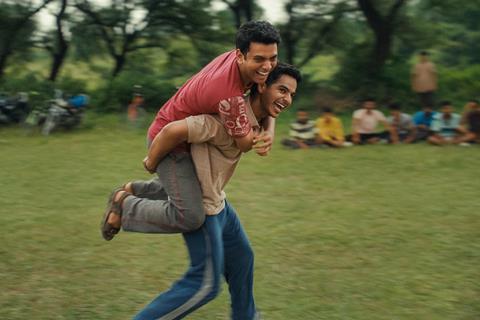Story of two friends attempting to escape their marginalised roots could be an Un Certain Regard breakout

Dir/scr: Neeraj Ghaywan. India. 2025. 117mins.
Does being homebound indicate remaining where one is, or does it suggest travelling back to one’s roots? The word holds several meanings for two friends living on India’s fringes and seeking to defy their marginalisation by heading to the city to sit for police department exams. Making its world premiere in Un Certain Regard, Neeraj Ghaywan’s Homebound spans a few harrowing and tragic years in the lives of Muslim and scheduled caste (formerly ‘dalit’ or ‘untouchable’) friends, and paints a vivid portrait of the struggle faced by India’s invisible population to conduct a dignified and joyful existence. Deeply empathetic and increasingly universal, Ghaywan’s sophomore effort isn’t particularly subtle, but that does little to dilute the film’s impact or detract from its message.
Ishaan Khatter and Vishal Jethwa have a natural, believable dynamic
It’s easy to see why Martin Scorsese came on board early as an executive producer: the Mean Streets undercurrents are strong in Homebound, albeit with less crime and loansharking. Ghaywan revisits some of the territory he explored in his 2015 debut Masaan, also an Un Certain Regard entry and FIPRESCI Prize and the Prix de l’Avenir winner, but broadens his scope to encompass gender as well as class issues, as well as touching on the Covid-19 pandemic. There’s no reason why Homebound can’t follow a path similar to All We Imagine As Light, last year’s Cannes breakout about contemporary India. Art house distributors and streaming outlets should show interest after a likely festival run.
Chandan Kumar (Vishal Jethwa, Mardaani 2) and Mohammed Shoaib (Ishaan Khatter, A Suitable Boy) are childhood friends who decide the road to respectability and equality runs through the civil service. Growing up in a small village in northern India, they’re convinced that earning one of the 3,500 spots from among 2.5 million applicants, and putting on the uniform of the national police, will end their lives of poverty and discrimination. Despite their religious and social differences, the pair are close friends, with practical Chandan keeping the more fiery Mohammed out of trouble.
Their friendship is tested when Chandan passes the test, but Mohammed does not. Chandan anxiously waits for his duty assignment while Mohammed takes a job with an electronics dealer and does his best to earn the respect of his Hindu co-workers. By the time Covid-19 hits in 2020 and India goes into lockdown, the two young men have drifted apart and come back together again.
Ghaywan’s points about Hindu nationalism and lingering class bias are on the nose, but he never belabours them, and he gets plenty of help from a stellar cast led by Khatter and Jethwa. Chandan’s casual attempt to avoid revealing his surname to a student they meet at the train station, Sudha Bharti (Janhvi Kapoor) – and therefore indicating his caste – is nicely underplayed. Khatter buries Mohammed’s fury at being asked to produce residency papers and a clean police record for a sales job, but the fight between yelling and remaining silent is palpable.
Ghaywan throws a wide net and lets Chandan’s sister Vaishali (Harshika Parmar) stand in for all the SC girls and women who will simply never get the opportunity to go to college – and Sudha does the same for the ones that do and have to work twice as hard. Through it all Ghaywan never loses sight of the main story, which is Chandan and Mohammed’s lifelong bond.
Regardless of the stresses, Ghaywan finds time for moments of grace and joy for the friends, from simple pleasures like tucking into Mohammed’s mother’s biryani or wrestling over Chandan’s mother’s pickles with fellow textile workers in Surat. Khatter and Jethwa have a natural, believable dynamic that lends the story much of its power and underpins it with a coming-of-age angle.
Complemented by an unobtrusive but evocative score by Naren Chandavarkar and Benedict Taylor that mixes Indian rhythms with traditional orchestral swells, Pratik Shah’s visuals give the country’s normally teeming streets and the closing act’s mass homeward migration an eerie, heart-breaking beauty.
Production companies: Dharma Productions
International sales: Paradise City Sales, sales@memento-films.com
Producers: Karan Johar, Adar Poonawalla, Apoorva Mehta, Somen Mishra
Screenwriter: Neeraj Ghaywan, based on the New York Times article ’Taking Amrit Home’ by Basharat Peer
Cinematography: Pratik Shah
Production design: Khyatee Kanchan
Editor: Nitin Baid
Music: Naren Chandavarkar, Benedict Taylor
Main cast: Ishaan Khatter, Vishal Jethwa, Janhvi Kapoor, Harshika Parmar, Dadhi R Paandey, Shalini Vatsa, Pankaj Dubey, Sudipta Saxena, Chandan K Anand
























